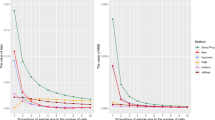Abstract
Basu and Basu (Statistica Sinica 8:841–860, 1998) have proposed an empty cell penalty for the minimum power-divergence estimators which can lead to improvements in the small sample properties of these estimators. In this paper, we study the small and moderate sample performances of the ordinary and penalized minimum power-divergence estimators in terms of efficiency and robustness for the log-linear models in two-way contingency tables under the assumptions of multinomial sampling. Calculations made by enumerating all possible sample combinations show that the penalized estimators are competitive with the ordinary estimators for the moderate samples and definitely better for the smallest sample considered for both efficiency and robustness under the considered models. The results also reveal that the bigger the main effects the more need for penalization.
Similar content being viewed by others
References
Basu A and Basu S (1998). Penalized minimum disparity methods for multinomial models. Stat Sin 8: 841–860
Beran R (1977). Minimum Hellinger distance for parametric models. Ann Stat 5: 445–463
Berkson J (1980). Minimum chi-square, not maximum likelihood. Ann Stat 3: 457–487
Cressie N and Read TRC (1984). Multinomial goodness-of-fit tests. J R Stat Soc B 46: 440–464
Cressie N and Pardo L (2000). Minimum ϕ-divergence estimator and hierarchical testing in log-linear models. Stat Sin 10: 867–884
Harris IR, Basu A (1997) A generalized divergence measure. Technical report. Applied Statistics Unit, Indian Statistical Institute, Calcutta, 700 035, India
Lindsay BG (1994). Efficiency versus robustness: the case for minimum Hellinger distance and related methods. Ann Stat 22: 1081–1114
Menéndez D, Morales D, Pardo L and Vajda I (2001). Minimum divergence estimators based on grouped data. Ann Inst Stat Math 53: 277–288
Menéndez D, Pardo JA, Pardo L and Zografos K (2006). On tests of independence based on minimum ϕ-divergence estimator with constraints: an application to modeling DNA. Comput Stat Data Anal 51: 1100–1118
Pardo L and Pardo MDC (2003). Minimum power-divergence estimator in three-way contingency tables. J Stat Comput Simul 73: 819–831
Read TR and Cressie N (1988). Goodness of fit statistics for discrete multivariate data. Springer, New York
Simpson DG (1987). Minimum Hellinger distance estimation for the analysis of count data. J Am Stat Assoc 82: 802–807
Simpson DG (1989). Hellinger deviance test: efficiency, breakdown points and examples. J Am Stat Assoc 84: 107–113
Author information
Authors and Affiliations
Corresponding author
Rights and permissions
About this article
Cite this article
Alin, A., Kurt, S. Ordinary and penalized minimum power-divergence estimators in two-way contingency tables. Comput Stat 23, 455–468 (2008). https://doi.org/10.1007/s00180-007-0088-2
Accepted:
Published:
Issue Date:
DOI: https://doi.org/10.1007/s00180-007-0088-2



